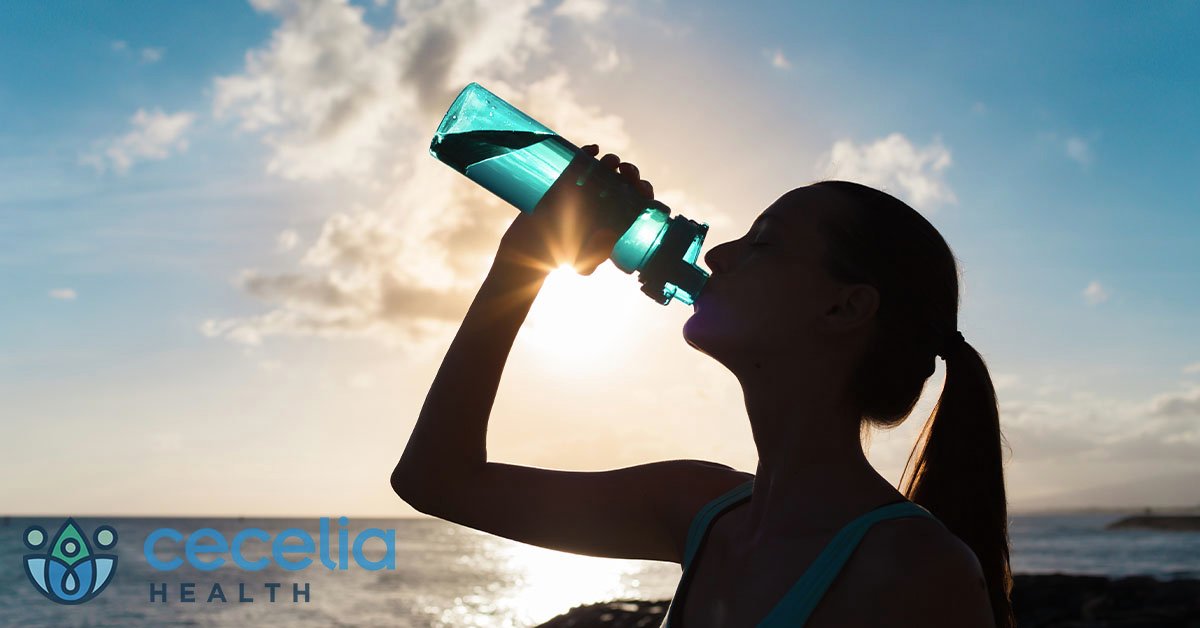Water is an essential component in our bodies. Every day we lose water through normal activities. Water is used by cells, organs, and tissues to help regulate temperature and to maintain overall bodily functions. We lose water throughout the day from these bodily functions including breathing, sweating, and digestion. It is therefore crucial to rehydrate by drinking fluids and eating foods that contain water throughout the day. Drinking sufficient amounts of water not only keeps your body functioning properly, it is also key for weight management and overall health.
How much water do we need?
The average adult loses on average 10 cups of water each day. Therefore, drinking approximately 8–12 cups throughout the day is the minimum recommended amount to keep sufficiently hydrated. Though drinking more is preferred as there are many external variables that contribute to dehydration. External factors that increase the need for additional water and elevate the risks of dehydration include:
- Heat
- Level of physical activity
- Diet (high protein content, caffeine, alcohol, sugary and/or salty foods)
- Illness (especially fever, flu, stomach bug)
We often confuse hunger with thirst. Some helpful tips to keep hydrated:
- Always keep a water bottle with you and refill regularly
- Don’t wait for thirst, sip throughout the day
- Consciously drink a full glass of water before and after meals
- Check to ensure urine is clear or very light-colored
Potential signs of dehydration to look out for:
- Nausea/Vomiting
- Headaches, light-headedness and loss of energy
- Elevated body temperature
- Dry/chapped lips and tongue, and/or dry skin
- Water retention problems
- Muscle/joint soreness, muscle cramps
- Hoarse voice
- Constipation
- Restlessness
- Low-volume and/or dark-colored urine
Food sources to help hydration
In addition to drinking sufficient amounts of water every day, certain food sources can also aid hydration (foods should be treated as a substitute to drinking water). Many fruits and vegetables are very high in natural water content, as part of an overall healthy balanced diet, include plenty of water rich sources of produce in your daily diet. Raw produce is optimal to aid hydration, cooking or heating will remove water content. Foods high in water include:
- Watermelon, cantelope, strawberries, peaches, oranges
- Celery, cucumber, zucchini, tomatoes
- Low sodium broth
- Low fat milk
Avoid sugary drinks to hydrate
Sugary drinks such as soda, fruit drinks, sports drinks, energy drinks, sweetened waters, coffee and tea beverages with added sugars, can all exacerbate dehydration. Large consumption of sugary beverages also increases the likelihood to develop long term health problems such as weight gain, obesity, type 2 diabetes, heart disease, kidney diseases, non-alcoholic liver disease, tooth decay/cavities, and gout. Therefore, limiting sugary drinks is key to help maintain a healthy weight and contribute towards a healthy diet. Average sugar content in beverages according to the CDC:
| Drink (12-ounce serving) | Teaspoons of Sugar | Calories |
| Tap or Bottled Water | 0 teaspoons | 0 |
| Unsweetened Tea | 0 teaspoons | 0 |
| Sports Drinks | 2 teaspoons | 75 |
| Lemonade | 6 ¼ teaspoons | 105 |
| Sweet Tea | 8 ½ teaspoons | 120 |
| Cola | 10 ¼ teaspoons | 150 |
| Fruit Punch | 11 ½ teaspoons | 195 |
| Root Beer | 11 ½ teaspoons | 170 |
| Orange Soda | 13 teaspoons | 210 |
Consuming plain water all day to keep you hydrated can be difficult. Here are some helpful ways to liven up your drink include:
- Add fruit such as berries, slices of lime, lemon, or cucumber
- Add a small splash of 100% juice to plain water
- Drink naturally flavored sparkling water drinks with no added sugar or sodium
Remember, a hydrated body is a healthy and happy body!
